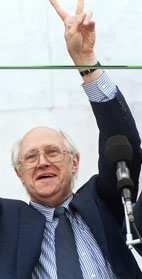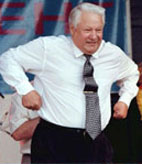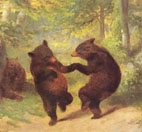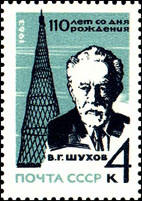It’s a pity Vladimir Lenin was tone deaf, and dismissed music as an entertainment for the ruling class.
 |
Had he an ear and taste for classical music — like Karl Marx, who was keen on Beethoven, or Leon Trotsky, who loved Verdi, he might have devised a revolutionary doctrine for the performing arts. This could have protected Russia from the likes of Mstislav Rostropovich the cellist. |
 |
 |
Rostropovich was one of Russia’s best-known classical musicians, who grew personally rich and powerful during the rule of Boris Yeltsin. Even Oleg Deripaska complained that Rostropovich demanded too much money for playing in Samara, a region whose entertainment Deripaska’s aluminium company sponsored before it sold Samara Aluminium Works to Alcoa. | |
 |
But Yeltsin, who beat Lenin in musical handicaps – he was both tone-deaf and dysrhythmic — and Rostropovich allowed one of the greatest achievements of Soviet culture – Radio Orpheus, the classical music radio station, to fade almost away for lack of state budget funds to support a powerful signal, studios, and the music archive. At the time in the 1990s, broadcasting was on ultra short-wave and medium-wave frequencies, and stopped between midnight and 6 in the morning. Money was so desperately needed, a daily advertisement for religion was introduced until 2001. Then in 2004, the more powerful FM signal was introduced via satellite, with six regional transmitters. A seventh is planned. The radio now has the largest classical music audience in the world – 25 million. There are no time pips, no advertisements, no discreditable news bulletins like BBC Radio 3, almost no chatter, and no stream of half-hourly self-promotion that is a feature of Classic FM, the only commercial outlet for classical music in Britain. | |
 |
Rostropovich and Yeltsin are now dead and buried — Radio Orpheus lives. |  |
| It is another matter entirely whether you think classical music lives, or whether you must be dead to want to listen to it. In 2004, Mikhail Pletnev, the pianist and conductor, said he thought: “There is a time to throw stones, and a time to collect them up. Those words are from the Bible. Now we are collecting the stones. It means there is a time for everything. There is a time for ancient music, and a time for jazz… I compose in the way I was brought up. In the language of Rachmaninoff. That is how people of our generation feel. There were certain circumstances which helped classical music to be born, then it hit the heights. It’s like a mountain range — you don’t know exactly where it starts, but suddenly you are in the heights. Then you go on, then you are among smaller hills, then no more mountains — it is finished. For me the last great mountain was 30 years ago — Shostakovich’s 15th Symphony." | ||
 |
You can find out whether you are dead or alive by tuning into Moscow’s Radio Orpheus digitally. All you have to do is to go to this link, and then: |
|
|
And if you want to meet the Stalins of sound, here’s where to start: And the alternative: |
||
| Contact the Editor | ||










